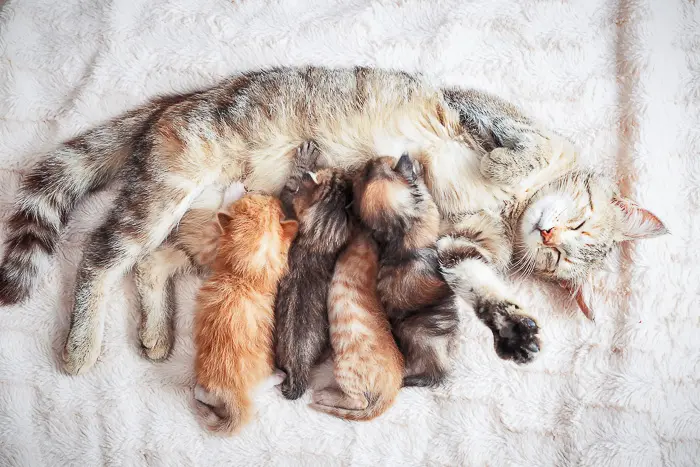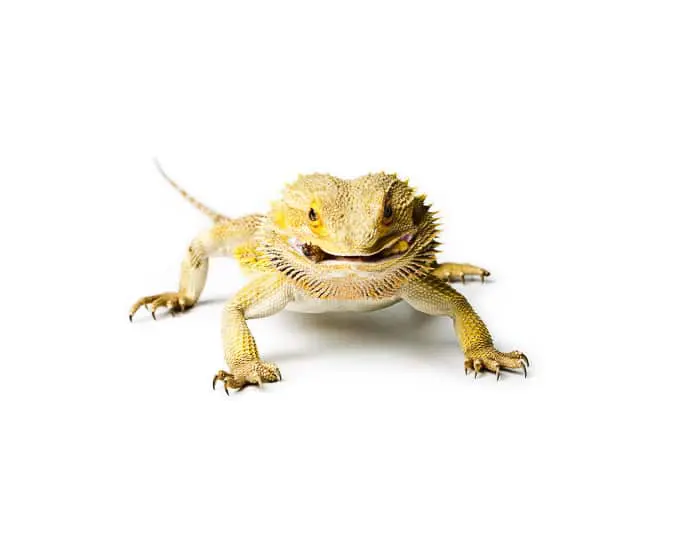Are you one of those sleep deprived kitten owners who are disturbed at wee hours in the morning with a scratching at the bottom of the door, a walk across the chest, a quick pounce over the bed, or a bellowing meow for a midnight snack?
If your kitten wakes you up in the middle of the night, there may be a reason for it, but there also may be things that you can do to help mitigate the problem. You will need patience and compromise in order to possibly change this behavior.
You've also likely heard of cat naps, and lazy kittens, and sunbathing kittens, and snoozing kittens. What are normal and healthy sleeping kitten behaviors? Should you be worried about your own furry feline friend?
Dr. Jess addresses some of the most common kitten sleeping questions below and how you can try and encourage healthy sleep patterns with your kitten below:

Kittens in The Wild:
Your kitten's sleep patterns go back for hundreds of years, with how their genetic ancestors lived when they were feral, wild cats.
Today's kitten had ancestors that were predators who hunted for short periods to conserve precious energy. To conserve even more energy to keep the species thriving, they would sleep most of the rest of their day.
You may notice that your kitten’s sleep patterns will very likely be similar to this pattern – lots of sleep with short spurts of activity.
How Long Do Kittens Normally Sleep?
Just like humans, kittens normally sleep for different amounts of time, it depends on the individual. However, there is an average range of normal sleeping hours most kittens fall into during a 24 hour day.
Most kitties, on average, sleep between 20 and 22 hours per day.
That being said, it is highly unlikely that your kitten will snooze for that long in one large chunk.
It is much more of a probability that your furry friend will take a couple hours long snoozes here and there.
So why is that?
Why Do Kittens Sleep So Much?
Kittens seem to sleep a lot to us. As humans, we are considered diurnal – we are awake and most active, naturally, during the day.
But kittens are a little bit different than us here.
Kittens are considered crepuscular. This means that they are awake and most active at dawn and dusk.
Many other animals, such as the rabbit, the hamster, and the chinchilla, are also considered to be crepuscular in nature. So kittens aren't the only odd-balls here!
Is My Kitten Actually Sleeping?
It may be sometimes hard to tell if your kitten is actually sleeping or not.
Kittens can experience strange-looking eye movements during their slumber [source 1, source 2] just like humans, so it may seem that they are awake.
Their limbs may move as if they are dreaming of chasing something. They may make noises as if calling to someone.
But these things may all occur while your furry feline friend is completely asleep, and most likely pretty deeply asleep.
What is a Catnap?
A catnap is a term that many people use to describe a generalized nap session held during the day, typically a shorter-term nap. A 20 – 30 minute catnap can have many benefits, including potentially reliving drowsiness!
Why Do Kittens Sleep Next To You or On You?
Your kitten really likes the human that they have bonded with.
Whether it is the person who feeds them, who gives them attention and pets, them, or who makes them feel the safest, your kitten will likely want to curl up next to the warm body that they have a connection with the most. Congrats! They feel safe with you!
Many times, you can observe Fluffy at the foot of your bed, while other times, they like to wrap themselves up on your pillow, around your head.
Still, other kittens are more of a lap cat, and like to cuddle you while you are sitting upright in a chair or on the couch.
While other kittens, are more independently-willed, and just like a hnd or arm next to them while they snooze – any more than that would be too much for them.
Are There Common Kitten Sleeping Positions?
There are some more common sleeping positions for kittens.
Your feline friend may tend to sleep more consistently in a few of these positions, depending on their preference, just like how humans have a preference in if they sleep on their back or their sides.
Curled up in a Ball:
This position helps the kitten in more than one way.
First off, it helps protect those vitals organs from harm's way, because those vital organs are all curled up in the inside of that fur ball snoozing.
Secondly, when your kitten is all curled up all cute and cuddly, they are also holding in a lot of homemade heat. What a great way to conserve heat and energy!
Laying on Their Back:
If your kitten is laying on their back and their belly is up, showing off their abdomen to the world, then you should feel oh so good.
This is because your cat feels so safe and secure that they can let their vital organs out on full display and not worry that they will come under attack.
For a kitten, showing their bellyside off means giving off a huge amount of vulnerability and risking their overall safety.
So if your kitten can sleep in this position – feel good in that your cat feel very safe in their environment that you have provided them!
Laying on Their Side:
When your kitten sleeps on their side, it is very similar in thought as when they are sleeping on their backs, bellies up.
They have their bellies and organs partially exposed – so they are quite relaxed and stress-free when it comes to feeling safe.
No worries in the world will allow them to sleep soundly on their sides.
Paws Covering Their Eyes:
When your kitten covers their eyes with their paws, they are making a valid attempt to sleep.
Whether they are trying to block out the bright daylight while in slumber, or just tune out their environment surrounding them, placing their cute little paws on their face sometimes seems like the best way to combats the noisy outside world.
Contortionist:
There is no real rhyme or reason to this position. If your cat is feeling loosey-goosey and is also primed for a nap, some kittens will just fall asleep as they lay, tied up all wonky or pretzel-like.
Healthy Kitten Sleep Patterns:
Sleep and a healthy, well balanced diet are both necessary in order for your kitten’s nervous, skeletal, immune, and muscular systems to develop correctly.
A newborn kitten will spend most of their time in a day sleeping. In fact, a newborn kitten will sleep anywhere from 21-22 hours per day.
In the following 2-3 weeks, the sleeping amount will decrease slowly, with the average 2-3 week old kitten will typically sleep between 20-22 hours.
By the time your kitten is 8-9 weeks old, they will be sleeping around the same amount of time as an adult can does, somewhere closer to 18 hours a day.
Can You Train Your Kitten to Sleep?
Cats are known to be crepuscular animals, which means that they have a tendency to be most active at dawn and at dusk.
In the wild, cats hunt as the sun comes up and as it sets and goes back down. These cats would then sleep during the day.
Your kitten is genetically programmed to do this too. Today's domestic kitten sleep is also very adaptable, especially if you try the recommended steps that I will share with you below on how you can help your kitten's sleep patterns.
The main issue of getting a kitten to sleep when you would like them to, is how comfortable they are and well the sleeping condition match their current needs. I say “current”, because their needs may change throughout the day or night!
Working toward that best kitten sleep schedule for you and your family situation does take time – it will not be an overnight success.
In fact, you may have to train your kitten or your cat multiple times throughout their lives, about their preferred sleep patterns.
How To Train Your Kitten To Sleep:
You have a routine every day. It keeps you on track, day and night. Your cat can too. You can encourage your cat to sleep through the night with some techniques I will discuss further down.
There are many ways that you can go about training your kitten to more likely sleep during desired times in their 24-hour day. No matter which way you choose to try, there is no guarantee that any way is going to work with any kitten. Each cat is so different.
Another thing to point out, is that if you are weary about any technique, ask a professional first. Your veterinarian or pet trainer is a great place to start.
Secondly, if you are concerned about your kitty having a medical issue because of how they are treating their sleep patterns, please contact your local veterinarian to get idea on how, what, or when, to move forward with sleep pattern training.
So if there are no concerns about your kittens overall health, and you are wanting to try some techniques that may help your cat sleep at more opportune times, read on below to find out how you can start practicing with your kitten today:
1. Designate a Sleeping Area:
Designate an area in your house for your kitten to sleep in every day. This designated area needs to be in the same place every day.
It is very important to keep this space consistent throughout this sleep pattern training journey.
If possible, create this space in an area that can be closed off, possibly a room or spacious closet, where there will be less foot traffic, noise, and possibility of them awakened in the middle of the night by something or someone else.
This area should also be off-limits to other people and animals – this is strictly a space for your kitten to sleep. Also, set the precedent that the designated sleep area is a ‘no-play zone' and keep all cat toys out of the room.
2. Keep It Comfy:
In order for any person or animal, including your kitten, to sleep, we must all be somewhat comfy.
If we are desiring our kitten to sleep in an designated area at a designated time, then we better come prepared with a very comfy setup for them. Therefore, I put this step very close to the top of my list.
If you kitten is having issues sleeping when you want them to already, being uncomfortable when they do sleep, is just going to make the issue worse.
Try placing soft, fluffy bedding or blankets in a corner of their designated sleeping quarters.
Turn any lights off or atleast dim the lighting in this space.
Turn off anything making noises.
Remove any unnecessary odors, like candles or room sprays from the area.
3. Reschedule Dinnertime:
If your kitten is anything like me or most other animals, going to bed on an empty hungry stomach is uncomfortable.
We want to make sure that your kitten is in “food coma” mode when being asked to settled down and get some Zzzz's.
Therefore it is best to offer their dinner meal closer to the time when they are needing to slow down for the night.
This may look like a dinnertime closer to 7, 8, or 9pm, rather then 4 or 5pm in the early evenings.
Kittens tend to sleep better with a full belly, so schedule their dinnertime meal just before your bedtime and leave a small amount of cat food for them to get access to, during the night in their designated sleeping area.
4. Play Throughout the Day:
Nighttime activity is a natural ordeal with cats of all ages, so it can take time for certain kitties to adjust their play schedules, while others seem to quickly and easily change their playful tendencies.
I love to workout at night. I tend to fall asleep faster and easier when I do.
Same thing can be the case for your kitten.
Playing vigorously before bed can have the same exercise-induced effect – a tired out kitten is more likely to fall asleep after a good workout or play session. A tired kitten is more likely to sleep through the night too.
5. Ignore the Cuteness:
As cute as your kitten is, the best way to change your kitten's sleep pattern is going to be ignoring them even on the first attempt of theirs to get your attention, whether it's positive attention with extra pets, food, treats, or play, or negative, with scolding or removing of treats or toys.
Ever lost sleep while your cute kitten plays with your feet under the covers every night?
Have you been pounced on by a speed-racing, playful cat with the “zoomies”, as they land on your stomach at 2am?
Ever woken up at the crack of dawn because your kitten is meowing for your attention?
Each time you respond in the middle of the night, it trains him to try harder to wake you on subsequent nights.
This is where your willpower will be tested. If your kitten learns that a certain action will get them attention, they will continue to do that activity over and over again, no matter what time of day.
So you have to stand strong and make sure that what this behavior is for your cat is, that it is not rewarded in any way.
6. Keep It ‘Hush-Hush':
The louder your kitten's environment is, the more likely they are to wake from their slumber. We don't want that! A few things that you can do to keep them sleeping for you to consider.
- Keep the designated sleeping area door closed while they sleep.
- Use a fan or a sound machine to drown out outside noises.
- Have the traffic walking path far from your kitten's sleep area.
7. Stick to The Schedule:
Whether it means setting out food, scooping the litter box, or breaking out the toys – do these activities on a regular and set schedule.
Aim to clean the litter box, play, feed, and sleep at the same time of day every day for your kitten. Your kitten will eventually learn when to expect each activity on this set schedule.
When to Worry About Your Kitten's Sleeping Behaviors:
If your kitten suddenly changes their sleeping habits of any kind, note the abrupt change, and contact your veterinarian to see if they believe the change should be of a concern.
Your vet may ask to see your kitten to make sure that they are healthy and that no health concerns are occurring internally, where you can't see.
If your kitten stops or changes their other daily needs, such as changes in eating, drinking, or bathroom habits, it may affect their sleep.
This problem also needs to be addressed by your veterinarian.
Kitten Sleeping Summary:
Kittens need sleep just like all other mammals. And they need a lot of it.
Most kittens will break up their hours of sleep into smaller snooze sessions throughout a 24-hour period.
Kittens who sleep more or less than the 20-22 hours could be completely normal, but it could also be a sign that something is wrong.
If any of your kitten's sleeping habits suddenly change, contact your veterinarian immediately for directions on what to do next – it could mean that there is a health issue.

![[Vet Explains Pets]](https://vetexplainspets.com/wp-content/uploads/2024/09/cropped-vetlogo-199x66.png)

